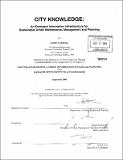| dc.contributor.advisor | Joseph Ferreira, Jr. | en_US |
| dc.contributor.author | Carrera, Fabio, 1961- | en_US |
| dc.contributor.other | Massachusetts Institute of Technology. Dept. of Urban Studies and Planning. | en_US |
| dc.date.accessioned | 2005-09-27T18:21:27Z | |
| dc.date.available | 2005-09-27T18:21:27Z | |
| dc.date.copyright | 2004 | en_US |
| dc.date.issued | 2004 | en_US |
| dc.identifier.uri | http://hdl.handle.net/1721.1/28790 | |
| dc.description | Thesis (Ph. D.)--Massachusetts Institute of Technology, Dept. of Urban Studies and Planning, 2004. | en_US |
| dc.description | Includes bibliographical references (p. 245-256). | en_US |
| dc.description.abstract | (cont.) updates. It produces plan-ready information, by exploiting the self-serving and opportunistic pursuit of instant return-on-investment by frontline offices. Thanks to its emergent qualities, City Knowledge engenders unexpected plan-demanding situations, where the ability to conduct second-order analyses leads to deeper knowledge of our cities. In the end, this dissertation proposes a paradigmatic shift by recommending that information be considered as a bonafide infrastructure and be consequently treated with the same attention that cities reserve to other infrastructures such as utilities and roads. It proposes that communicative planners become catalysts of this transformation away from the "hunting-and- gathering" of urban data and toward the "farming" of municipal information. | en_US |
| dc.description.abstract | Recent advances in geo-spatial technologies, together with a steady decline in their cost, have inspired many spontaneous bottom-up municipal GIS initiatives aimed at improving many aspects of urban maintenance, management or planning. Some communities have institutionalized top-down citywide urban information systems with limited results, due to many organizational and institutional factors. Despite some encouraging progress, comprehensive urban information systems are still not commonplace and planners and decision makers still struggle to acquire the rich information that they need to conduct in-depth analyses and to make important decisions. This dissertation suggests a plausible strategy and several practical tactical solutions to set municipalities on a trajectory leading to City Knowledge. The concept of City Knowledge is introduced by first presenting numerous case studies ranging from the maintenance of the canals in Venice, Italy, to tree management in Cambridge to planning for Worcester, Massachusetts. Each of the cases reveals some lessons about City Knowledge, contributing to the identification of fourteen desirable qualities and consequently to the distillation of the six foundations of City Knowledge: (1) the "middle-out" approach; (2) informational jurisdictions; (3) fine-grained, distributed data management; (4) sustainable updates; (5) information sharing and (6) interagency coordination. The middle-out approach combines the virtues of top-down rigor and reliability with the bottom-up qualities of energy and creativity. Being an emergent system, City Knowledge leverages the dominant plan-demanded mode of data acquisition to gradually and inexpensively accumulate high-return data and to ensure sustainable, low-cost | en_US |
| dc.description.statementofresponsibility | by Fabio Carrera. | en_US |
| dc.format.extent | 256 leaves | en_US |
| dc.format.extent | 20713680 bytes | |
| dc.format.extent | 20747615 bytes | |
| dc.format.mimetype | application/pdf | |
| dc.format.mimetype | application/pdf | |
| dc.language.iso | en_US | |
| dc.publisher | Massachusetts Institute of Technology | en_US |
| dc.rights | M.I.T. theses are protected by copyright. They may be viewed from this source for any purpose, but reproduction or distribution in any format is prohibited without written permission. See provided URL for inquiries about permission. | en_US |
| dc.rights.uri | http://dspace.mit.edu/handle/1721.1/7582 | |
| dc.subject | Urban Studies and Planning. | en_US |
| dc.title | City knowledge : an emergent information infrastructure for sustainable urban maintenance, management and planning | en_US |
| dc.type | Thesis | en_US |
| dc.description.degree | Ph.D. | en_US |
| dc.contributor.department | Massachusetts Institute of Technology. Department of Urban Studies and Planning | |
| dc.identifier.oclc | 60248817 | en_US |
